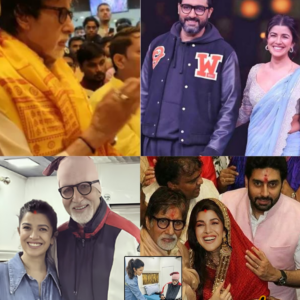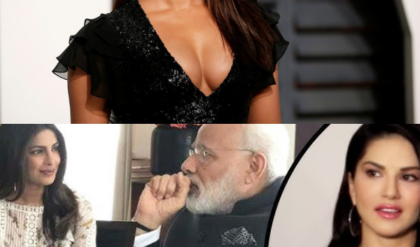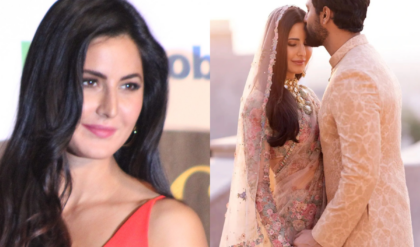Why Would India’s Richest Actress Take Alimony From Her Comparatively Poor Husband?
In a surprising turn of events, news has emerged regarding one of India’s richest actresses seeking alimony from her husband, who is considerably less affluent.
This situation raises intriguing questions about relationships, financial dynamics, and societal expectations in the glamorous world of Bollywood.
At the center of this discussion is Aishwarya Rai Bachchan, an iconic figure known not only for her extraordinary talent but also for her immense wealth and fame.
Her marriage to Abhishek Bachchan, also an accomplished actor but with a comparatively modest financial standing, has often been scrutinized.
The couple’s relationship has been a subject of fascination for fans and the media alike.
However, the revelation that Aishwarya is seeking alimony has sparked debates about gender roles, financial independence, and the implications of wealth in personal relationships.
Typically, alimony is associated with situations where a financially dependent partner seeks support after a separation or divorce. However, Aishwarya’s case presents a unique perspective.
As a woman who has achieved remarkable success in her own right, why would she seek financial support from her husband? This situation can be viewed through various lenses, including societal norms, expectations of marital roles, and the complexities of love and partnership.

One interpretation is that Aishwarya’s decision may stem from her desire for fairness and acknowledgment of contributions within the marriage.
In many relationships, especially in traditional societies, financial contributions are often viewed as a measure of worth or commitment.
Despite her wealth, Aishwarya may feel that her sacrifices, whether emotional or personal, should be recognized and compensated.
This perspective challenges the conventional narrative that only the financially dominant partner deserves support.
Additionally, the dynamics of celebrity relationships often differ from those of ordinary couples.
The pressures of fame, public scrutiny, and the demands of the entertainment industry can strain even the strongest of bonds.
Aishwarya and Abhishek’s marriage has been under the watchful eyes of fans and media since its inception.

As such, Aishwarya’s request for alimony may also reflect a desire to assert her independence and ensure her emotional well-being, separate from her husband’s financial situation.
Moreover, the conversation around alimony in this context sheds light on evolving gender roles in India.
Traditionally, the expectation has been for men to be the primary breadwinners, while women were often seen as caregivers. However, as more women achieve financial independence, these roles are being redefined.
Aishwarya’s situation may exemplify a broader trend where women, regardless of their wealth, assert their rights within a partnership.
Critics might argue that seeking alimony could undermine Aishwarya’s status as a successful actress and a role model for aspiring women.
However, it is essential to recognize that seeking support does not equate to weakness. Instead, it can signify strength and the pursuit of fairness in a partnership.
Aishwarya’s choice may empower other women to voice their needs and assert their rights in their relationships.
Additionally, this case raises questions about societal perceptions of wealth and marriage.
While wealth can provide comfort and security, it can also complicate relationships. Aishwarya’s situation prompts a reevaluation of how society views the intersections of love, partnership, and financial dynamics.
It challenges the stereotype that wealth automatically equates to happiness and stability in relationships.
In conclusion, Aishwarya Rai Bachchan’s decision to seek alimony from her husband, despite her immense wealth, serves as a thought-provoking case study of modern relationships in India. It highlights the complexities of love, gender roles, and financial independence.
While public opinion may vary, this situation opens up vital discussions about equality, support, and the evolving nature of partnerships in the contemporary world. As society continues to change, so too will the expectations and norms surrounding marriage, wealth, and personal fulfillment.
News
Hrithik Roshan broke his silence to reveal the reason for his breakup with Sussanne Khan. What a shock!
Why did Hrithik Roshan- Sussanne Khan divorce? Zayed Khan shares SHOCKING deets Hrithik Roshan and Sussanne Khan’s divorce shocked many after 13 years of marriage, but the two remain close friends, co-parenting their children with mutual respect. Zayed Khan recently…
Priyanka Chopra wows best buddy Kareena Kapoor’s sizzling look in off-shoulder mini-dress
Kareena Kapoor and Priyanka Chopra. Bollywood star Priyanka Chopra has praised best buddy Kareena Kapoor Khan’s exceptionally sizzling look at a beauty store launch event organized by the accomplished Ambani family. Kareena Kapoor set Instagram on fire with her stunning…
Neena Gupta gets age-shamed for wearing shorts at ‘Panchayat 3’ screening, fans come in defense of the actress – WATCH video
In a candid conversation on Kareena Kapoor Khan’s chat show, Neena Gupta addressed criticism about her fashion choices with a witty retort. The seasoned actor also discussed the changing dynamics of the entertainment industry and entourage culture. Neena Gupta gave…
Kareena Kapoor Can’t Stop Laughing As She Chats With Singham Again’s Arjun Kapoor, Video Goes Viral
Kareena and Arjun recently reunited on screen in Rohit Shetty’s blockbuster hit, Singham Again. Kareena Kapoor shares laughs with Arjun Kapoor at Mumbai event. Kareena Kapoor and Arjun Kapoor sparked nostalgia among fans as they reunited at the Tira Beauty…
Threat to blow up the houses of Mukesh Ambani, Amitabh and Dharmendra, call from a strange person created a stir
Nagpur Police in Maharashtra was in panic after receiving a call from an unknown person. In a call made by an unknown person to the police, it was said that there would be bomb blasts at the houses of many…
Amitabh Bachchan Finally Accepts Abhishek Bachchan & Nimrat Kaur’s Relationship as His Daughter-in-Law After Aishwarya Rai
Amitabh Bachchan Finally Accepts Abhishek Bachchan & Nimrat Kaur’s Relationship as His Bahu After Aishwarya! In a surprising and emotional turn of events, veteran Bollywood superstar Amitabh Bachchan has finally come forward to publicly accept Abhishek Bachchan’s rumored relationship…
End of content
No more pages to load











